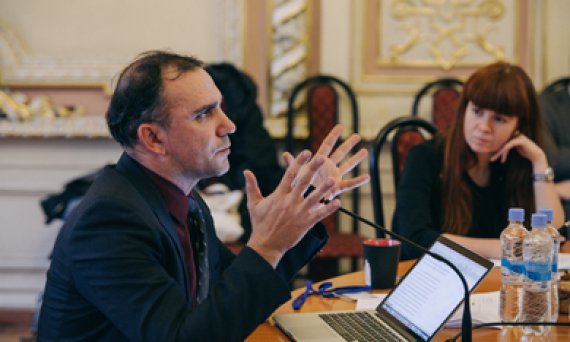The session “The Energy of Nature: Toward a New Philosophy of the Environment,” organized by the EUSP’s Department of Political Sciences and Sociology, took place on November 13th as part of the 9th VDNH conference.
In his introductory remarks, EUSP Department of Political Sciences and Sociology dean Artemy Magun provided an overview of the history of the concept of “energy.” Its meaning has changed fundamentally over time, as have many of its key concepts.
If in Aristotle’s Physics ‘enérgeia’ (ἐνέργεια), which etymologically encompasses the orientation of work and being-at-work, is a broad teleological concept reflecting action in relation to implemented force, then by the 17th century, especially in the works of Leibniz, the understanding of energy comes closer to our own. The scholar called it vis viva—the “living force”—and defined it as the product of the mass of a body and its velocity squared. In 1807 Thomas Young first used the word “energy” instead of vis viva in its modern sense—the same as Leibniz’s kinetic energy. In 1850 William Rankine introduced the difference between kinetic and potential energies to scientific thought.
In pondering the “energies” of Aristotle and Leibniz through the prism of potentiality, we can see the commonality in their thoughts: vis viva reflects an acting force, while “energy” means power.
Thus scholars have already perceived the material forces of nature—Leibniz’s vis viva or Spinoza’s natura naturans—as components of political legitimacy, constituting one of the key vectors of the further history of humanity.
Darin Barney, research chair in Communications Studies at McGill University (Montreal, Canada) spoke on how energy extraction became a political problem.
In The Second Treatise of Civil Government (1698), John Locke wrote about how extraction is a prerequisite for the development of capitalism. The progressivity of resource extraction was not questioned until the 20th century, when Jacques Rancière designated extraction as a constitutive political “evil.”
In our time, the “non-extraction” of resources has become an instrument for expressing a political position. Anti-extractivists fight for the prevention of climate change, non-extractivists for closeness to nature and local indigenous roots, and new extractivists for the seemingly irrational limitation of extraction in countries where the developing economy is directly dependent on the use of resources.
The desire to forgo economic benefits in the name of preserving nature is a new trend, the development of which we will see in real-time.
Is the new environmental agenda a step back toward a traditional way of life, or, on the contrary, an alternative variation of progress? This was reflected upon by University of the Basque Country philosophy professor Michael Marder, who spoke via skype from Madrid. The fact that the environmental movement arose namely in countries with developed economies presents a contradiction that can be considered in terms of perceptions of resource sustainability. Initially the extraction and use of raw energy materials did not take into account their depletion. The desire to master the totality of natural wealth occupied the minds of both practitioners and philosophers. Even when consciousness about the non-renewable resources emerged, there appeared alternative sources of energy that have adopted the philosophy of never-ending extraction. It will probably someday become self-evident that even alternative energy sources are also a non-renewable supply. Perhaps in order to realize the economy’s environmental potential we must focus not on what we use as a resource, but on how—how “cleanly” are we using it?
Oksana Timofeeva’s (EUSP) presentation highlighted another facet of the perception of resources. Nature has always been an object of philosophical thought, so it’s no wonder that a whole doctrine ecosophy arose. The world as nature can be divided into three “circles” with respect to the human: the home, the surrounding flora and fauna and the open cosmos. And in each of these strata of nature, subjects exploit various substances. Oil holds a special place among these substances, and scholars have always been occupied with its role in the natural balance. The alchemical perception of black gold assigns it, essentially, subjectivity. Is it possible that humanity, in forming a new philosophy of the environment, should, above all, abandon the subjectifization of oil?
Michael Lewis from the University of Sussex (Brighton, Great Britain) proposed to search for objectivity and sincerity in the world of fauna. In the naïve stubbornness of a cat attempting to catch a fish safe behind the glass of an aquarium, we can see a moment of manifest animal sincerity that is alien to humans. This view departs from the traditional opposition between animal and man, nature and historical progress. In this moment of pure sincerity, the former becomes the “infinitely good” (Hegel would describe exactly the opposite). In this regard we can see another opposition that at first glance seems quite implicit: “beauty” and “charm.” The “beautiful” may be orderliness and reasonableness, i.e. wholeness (the presence of a purpose), which opens the field to human creativity (whereas in animals, according to Kant, there is extrinsic beauty). Charm lies in unlimited freedom and spontaneity, in the tireless sincerity with which a cat can fish in an aquarium or the infinite pleasure of hearing birds singing. Is there any purpose in nature?
Nature preserves everything (natura conservat omnia), and preserves itself the most in the form of mineral resources—with this Georgios Tsagdis (University of Westminster, London) marked the final idea of the session. In fossil fuels both power (δύναμις) and energy (ἐνέργεια) are concentrated, and they passed into the fossil from a time before the emergence of nature and thought about it. We can thus speak about a certain arche-fossil, which represents a trace of time that is reflected in nature while simultaneously encompassing the legacy of the past, the power of the present and the energy of the future.
Kristina Emelyanenko















